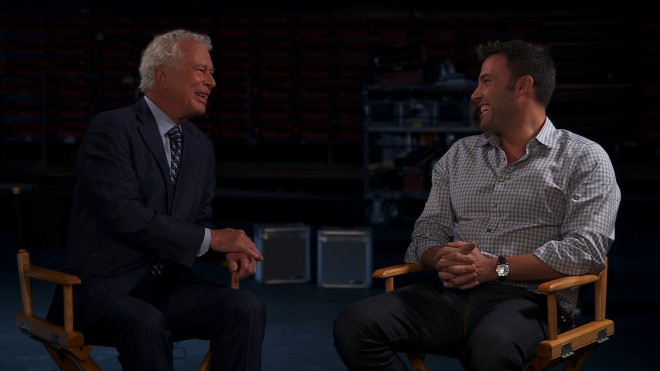Ben Affleck shows Ken Taylor some Hollywood diplomacy
In what must be a Hollywood precedent, Taylor got to rewrite the ‘Argo’ postscript—changing it from insult to tribute
Share

The stranger-than-fiction tale of Argo, has taken yet another bizarre twist. Ben Affleck, the movie’s director and star, has extended an olive branch to Ken Taylor, Canada’s former ambassador to Iran, who was distressed that Argo belittled the role that he and Canada played in the rescue of six American diplomats hidden in Tehran’s Canadian embassy in 1979. In an exclusive Maclean’s interview published after the film’s TIFF premiere, Taylor condemned the movie for rewriting history and giving CIA spy Tony Mendez most of the credit. He had not yet seen the movie—the filmmakers never contacted Taylor during production and he wasn’t invited to the premiere. But he’d gleaned enough from media reports and friends who saw it to become concerned. And his comments prompted Affleck and Warner Bros to do some major damage control.
Taylor told me he was surprised to pick up the phone at his Manhattan residence last week and hear: “Hello Ambassador, it’s Ben Affleck.” Warner Bros. then flew Taylor and his wife, Pat, to Los Angeles to see the film, meet Affleck and contribute a commentary to the DVD. “The movie is made and Tony Mendez dominates it,” says Taylor, well-aware that can’t be changed. But the ex-diplomat did succeed in making one crucial change to the film—replacing what he calls an insulting postscript that, as he says, “suggested the Canadian embassy received citations when really it was all the work of the CIA.” He says Warner Bros. agreed to remove it. “They said, ‘It’s expensive but we’ll take it out—why don’t you write something?’ ” So Taylor ended up scripting this new postscript that will appear at the end of the movie: “The involvement of the CIA complemented efforts of the Canadian embassy to free the six held in Tehran. To this day the story stands as an enduring model of international co-operation between governments.”
A character in a political thriller getting to rewrite the final words of a Hollywood movie—that must be a historic precedent.
Taylor seemed genuinely smitten with Affleck. “I must admit, he was very open and affable,” he says. “We were made very welcome. I spent the whole day with him. He kept asking probing questions, and the answers weren’t very complimentary to the movie.” Affleck was also present in the studio as Taylor and his wife recorded the DVD commentary. “There wasn’t much left unsaid,” says Taylor. “It was about an hour and a half.”
Much of the film, especially the nail-biting climax, still strikes Taylor as fiction. As they watched it in an L.A. screening room, his wife turned to him and said, “Jeez, did we get out of Tehran?” But Taylor felt that it was important “to try to reintroduce the fact that Canada was the principal player—without slandering the movie, because there’s no point.”
Given recent events, Taylor adds, the movie has acquired an unintended immediacy and he sees some value in that. “The timing, the pertinence and the relevant nature of the movie serves a purpose apart from the fact it’s a thriller,” he told me. “You look at the news today and it’s all about embassies being stormed, a U.S. ambassador assassinated—the embassy stands as the most convenient symbol. I think it’s good for the public to understand what’s going abroad with respect to their country’s image and how people are responding to that, particularly with the U.S. That’s the nature of diplomacy today; it’s a high risk game.” By dramatizing a story that’s over three decades old, Argo inadvertently shows “how embassies today are operating under a state of siege—the movie doesn’t intend to do that but visually it does.”
Affleck’s neglect of Taylor’s role in the story was likely an innocent oversight. He put his faith in a script he didn’t write, and had no idea that he was about to inflame such a sensitive point of Canadian pride by diminishing a national hero. “He said he was given the script,” says Taylor, “and I think it became clear to everybody that it would have been helpful if I would have been involved to some extent.” Now Affleck has gone out of his way to repair the damage, and take charge of the narrative before Warner Bros. stages a media junket for the movie at the end of this month. Taylor says there are also plans afoot for a Washington premiere on Oct. 10, to which he and various other Canadians involved in the story will be invited as honoured guests.
Regardless of its veracity, Argo remains a terrifically entertaining film that was generating Oscar buzz from the moment it premiered at TIFF. Oddly enough, despite diminishing Canada’s role in the rescue, it has more Cancon references than most Canadian movies—the TIFF audience lapped them up. When he was at the festival, Affleck talking a lot about the fabulous relationship between Canada and the U.S., then ended up having to smooth over a rift of his own making. By treating an ex-diplomat with a taste of lavish Hollywood diplomacy, he has quelled a controversy that might have hijacked publicity around the film and derailed an Oscar campaign. Just another wacky twist in a story that just keeps getting better.